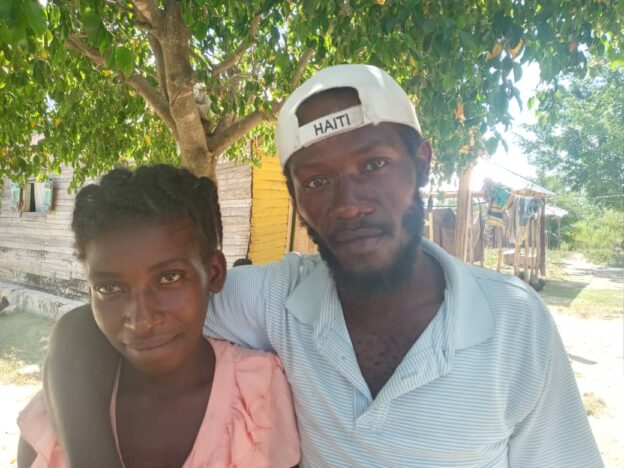Guerda and her partner, Renaud, live with their three-year-old daughter, Guerda’s little brother, and Renaud’s mother in a house that belongs to the older woman in Osedi, a neighborhood in northeastern Tomond. Gueda’s not from the area, but from Ench. Renaud explains that they met because “gason konn mache” or “guys get around.” He went to her home community in rural Ench to attend the first communion of the child of someone she knew. She had been living in downtown Ench at the time, but she went home for the communion as well. “That’s where we met.”
When the family joined the CLM program, Guerda had just begun a job as a cook in a local leader’s home. She felt forced to take it because the family was going hungry much of the time. The job paid just 1500 gourds per month, however. At today’s exchange rate, that’s just $25. For most of the summer, the exchange rate made it worth less than $15. She and Renaud would plant some crops on his mother’s land, but without resources to invest, their harvests couldn’t support them.
Guerda chose goats and peanut-farming as her two assets. After providing initial training, the CLM team gave her two goats and eight mamit, or coffee-cans, of peanuts for planting. She got lucky with her goats, because one of hers actually had a small not-yet-weaned kid already trailing behind it.
She and Renaud planted their peanuts using the training the program provided, and their harvest was good enough that they were able to sell two-thirds of it to buy another adult nanny-goat, one already pregnant. They re-planted the other third, which still was a marked increase over their first, eight-mamit planting.
Renaud then took a contract on a motorcycle taxi. That means that he found someone with the means to buy a new motorcycle, which Renaud pays for in eleven months by giving the owner 300 gourds per day. That is almost 100,000 gourds, which is over $1600 right now. It will be a windfall for the person he’s buying it from, but it is a way for him to get a motorcycle of his own. Even now, the income earns after he sets aside the 300 gourds is important to the family. It allows Guerda to save almost half of what she earns from her job, and she’s already purchased a pig from her savings. The small livestock is important to them — both the goats and the pig — because, as they say, “In the future, [these animals] can turn into a cow.”
And the couple really works together. Guerda is in a community savings and loan association that the program set up for its members, and she already took out her first loan, for 7500 gourds, to finance repairs to the motorcycle. Renaud explains that the motorcycle’s owner is not responsible for any repairs unless there is something wrong inside the engine itself, so he’s had to spend money on tires, the transmission, and other things as well. Guerda says that she’s made her first repayment, and she’s set aside the money for the second one, which comes due shortly. She’ll have two more payments after that.
She says that she is really happy about being in the program. “I speak to my case manager. She pushes me to move forward from where I am so I can change my life.”
